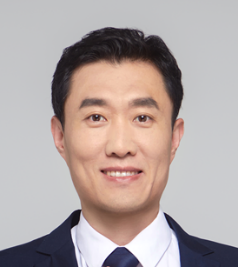
Liang Ge
Email:liangge@tsinghua.edu.cn
Research Area: Molecular Cell Biology
Cells are the fundamental units of life. The laboratory's primary interest lies in unraveling the essence of cellular biology, with a current focus on two pivotal cellular processes: unconventional protein secretion and autophagy.
Unconventional protein secretion: Protein secretion stands as a cornerstone issue in life sciences. People are generally acquainted with the "conventional" secretion, where proteins containing signal peptides traverse the cellular membrane through the SRP-SEC61 system and are subsequently released into the extracellular space via the endoplasmic reticulum-Golgi vesicle transport process. These groundbreaking discoveries have been documented in textbooks and were awarded the Nobel Prize in 1974, 1999, and 2013, respectively. However, recent research has revealed that many proteins lacking signal peptides can be secreted through an alternative, unconventional pathway, participating in various biological processes and human diseases such as cancer and neurodegenerative disorders. Our previous work identified a pivotal protein translocator TMED10 involved in unconventional secretion and unveiled a novel transmembrane protein transport pathway (THU) that regulates the entry of non-classically secreted proteins into vesicular transport (Cell, 2020). Research indicates that the THU system is equally significant as the well-known SRP-SEC61 system, simultaneously governing both unconventional and conventional intracellular secretion processes. Our research will center around THU, delving into its molecular mechanisms, identifying novel non-classical protein factors—potentially serving as disease markers, cytokines, or hormones—and revealing THU's functionality under diverse physiological and pathological conditions, encompassing development, aging, metabolic disorders, neurodegenerative diseases, and cancer.
Autophagy: Autophagy, a critical cellular process, involves the degradation of intracellular materials to maintain homeostasis. However, autophagic anomalies can lead to severe ailments, including cancer, neurodegeneration, and immune issues. Recognizing the significance of autophagy, one of the pioneers in the field, Yoshinori Ohsumi, was awarded the Nobel Prize in 2016. Over the past 30 years, thorough investigation has illuminated the molecular mechanisms of cellular autophagy across various facets, and the relationship between autophagy and numerous significant human diseases has grown relatively clear. Yet, the development of drugs targeting autophagy remains challenging due to its dual nature (both beneficial and detrimental) and the intricate regulation influenced by varying physiological and pathological factors. Our research is dedicated to deciphering the specificity of autophagic regulation under distinct physiological and pathological conditions, with the aim of identifying specific target molecules for autophagy in different disease scenarios, laying a theoretical foundation for autophagy-targeted therapies. Presently, our laboratory has identified the crucial protein CCT2 in regulating autophagy-mediated clearance of toxic aggregates, holding potential importance for treating neurodegenerative diseases like amyotrophic lateral sclerosis and Alzheimer's disease (published in Cell, 2022). Furthermore, we are delving into the regulation mechanisms of autophagy in specific cancer cells, aspiring to uncover the distinct regulatory mechanisms of autophagy in different cancer types, which could offer a novel theoretical basis for developing targeted anticancer drugs focusing on autophagy.
Selected publications:
1. Xinyu Ma, Caijing Lu, Yuting Chen, Shulin Li, Ningjia Ma, Xuan Tao, Ying Li, Jing Wang, Min Zhou, Yong-Bin Yan, Pilong Li, Kartoosh Heydari, Haiteng Deng, Min Zhang*, Cong Yi*, and Liang Ge*. CCT2 is an aggrephagy receptor for clearance of solid protein aggregates. Cell (2022) 185:1325-1345 (Highlighted in Nature Reviews Cell Biology [Paulina Strzyz. Chaperoning solid aggregates for autophagy. Nature Reviews Cell Biology (2022)], by Christian Behrends in Molecular Cell [Dorothee Dormann & Christian Behrends. Only solid waste, please! Molecular Cell (2022) 82:1408-1410], and by Daniel Klionsky in Autophagy [Zhihai Zhang & Daniel J. Klionsky CCT2, a newly identified aggrephagy receptor in mammals, specifically mediates the autophagic clearance of solid protein aggregates, Autophagy (2022)18(7):1483-1485]).
2. Shulin Li, Rui Yan, Jialu Xu, Shiqun Zhao, Xinyu Ma, Qiming Sun, Min Zhang, Ying Li, Jun-Jie Gogo Liu, Liangyi Chen, Sai Li, Ke Xu, and Liang Ge*. A new type of ERGIC-ERES membrane contact mediated by TMED9 and SEC12 is required for autophagosome biogenesis. Cell Research (2022) 32:119–138. (Highlighted by David Rubinsztein [Claudia Puri & David C. Rubinsztein. TMED9–SEC12, an important “contact” for autophagy. Cell Research (2022) 32:111–112])
3. Min Zhang#, Lei Liu#, Xubo Lin, Yang Wang, Qing Guo, Ying Li, Shulin Li, Yuxin Sun, Di Zhang, Xiachen Lv, Li Zheng and Liang Ge*. A translocation pathway for vesicle-mediated unconventional protein secretion. Cell (2020) 181:637-652. Selected for F1000Prime; Highlighted by Jayanta Debnath [Tan A. Nguyen & Jayanta Debnath. Unconventional secretion: cargo channeling by TMED10. Cell Research (2020)]
4. Xinyu Ma, Pilong Li, and Liang Ge*. Targeting of biomolecular condensates to the autophagy pathway, Trends in Cell Biology (2022) S0962-8924(22)00208-2. (Review)
5. Jianfei Zheng and Liang Ge*. Diverse cellular strategies for the export of leaderless proteins, National Science Open (2022) 1: 20220018. (Review)


